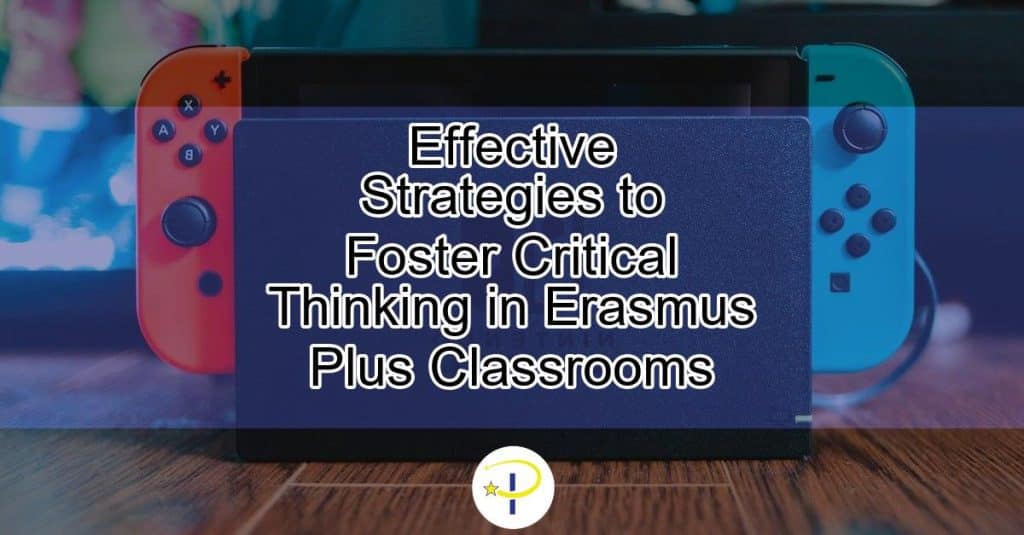Effective Strategies to Foster Critical Thinking in Erasmus Plus Classrooms
Welcome to our blog post on the importance and benefits of critical thinking in Erasmus Plus classrooms. As educators, we understand the value of this skill set and how it can positively impact our students’ academic and personal growth.
In this article, we will explore the definition of critical thinking and its significance in Erasmus Plus classrooms. We will also offer tips and techniques for teaching critical thinking, such as encouraging inquiry-based learning and using Socratic questioning to stimulate critical thinking.
Furthermore, we will discuss how teamwork and collaboration can be utilized to develop critical thinking skills in students. We will explore promoting cooperative learning strategies and fostering a positive learning environment for effective collaboration.
Finally, we will delve into assessing critical thinking skills in students and provide effective strategies for measuring their progress.
This article aims to provide practical and useful strategies that educators can implement in their classrooms immediately. We want to foster a positive and encouraging learning environment for all Erasmus Plus classrooms to reach their full potential.
Join us in this journey to enhance the critical thinking skills of our students. Let’s ensure that they flourish academically and personally as a result of our efforts.
Understanding Critical Thinking and Its Importance in Erasmus Plus Classrooms
Critical thinking is a fundamental skill necessary for success in the rapidly changing world of the 21st century. It is the ability to analyze information, evaluate situations and ideas, reflect on outcomes and make informed decisions.
Critical thinking is not simply a matter of memorizing facts but rather an active and ongoing process of inquiry and problem-solving. The goal is to foster independent learning, creativity, and informed decision-making, skills that are essential for lifelong learning.
Incorporating critical thinking into the Erasmus Plus classroom can lead to a range of benefits for students. It can help develop their ability to identify and solve problems, think creatively, communicate clearly, and work collaboratively.
The Definition of Critical Thinking
Critical thinking encompasses a range of intellectual skills and processes including analysis, evaluation, synthesis, and problem-solving. It involves questioning assumptions, considering multiple perspectives, seeking out reliable sources of information, making reasoned judgments, and applying knowledge and skills in practical situations.
In the classroom, critical thinking can be fostered through a variety of approaches including stimulating discussion questions, debates, group projects, and real-world problem-solving activities. Educators can also use coaching and personalized guidance to help students build their critical thinking skills.
The Benefits of Incorporating Critical Thinking in Erasmus Plus Classrooms
The benefits of incorporating critical thinking into the Erasmus Plus classroom are numerous. Students who learn to think critically are better able to understand complex issues, solve problems, and make informed decisions. They are also more effective communicators, collaborators, and leaders.
Furthermore, critical thinking can contribute to a positive and inclusive classroom environment by promoting respectful dialogue, encouraging creativity, and developing empathy and understanding. These skills are critical in today’s society, as students are increasingly required to work and interact in diverse and complex settings.
By incorporating critical thinking into the Erasmus Plus curriculum, educators can help prepare students for success in today’s rapidly changing world. They can also provide them with the skills and tools necessary for lifelong learning and personal growth.
Teaching Critical Thinking: Tips and Techniques
Encouraging Inquiry-Based Learning
Encouraging inquiry-based learning is not only an effective way to foster critical thinking skills, but also a way to create engaging and student-centered learning environments. This approach allows students to connect with the content in a personal and meaningful way, by encouraging them to ask questions, explore different ideas and perspectives, and construct their own understanding of the subject matter.
To promote inquiry-based learning, teachers can incorporate various strategies into their lesson plans. For example, they can use open-ended questions, encourage debates and discussions, provide opportunities for independent research and experimentation, and offer authentic problems that require creative and critical thinking.
Another effective approach is to use a project-based learning model, where students work collaboratively on long-term projects that address real-world problems. This approach allows students to take ownership of their learning, develop important skills such as collaboration and communication, and apply critical thinking skills in a practical and meaningful way.
Using Socratic Questioning to Stimulate Critical Thinking
Socratic questioning is a powerful tool for facilitating critical thinking, by helping students clarify their ideas, think more deeply and critically, and develop their own conclusions. This approach involves asking a series of relevant and thought-provoking questions that challenge students’ assumptions, help them to identify inconsistencies in their thinking, and encourage them to support their ideas with evidence.
To effectively use Socratic questioning, teachers need to be skilled at asking open-ended questions that promote thoughtful dialogue. They can also pose hypothetical scenarios, use analogies and metaphors to help students understand complex concepts, and encourage students to engage in critical and reflective thinking by evaluating their own thought process.
Additionally, teachers can incorporate other instructional strategies such as peer-to-peer discussion, reflective journaling, and close reading and analysis of complex texts to promote critical thinking skills.
In conclusion, by providing opportunities for inquiry-based learning and using effective questioning strategies such as Socratic questioning, teachers can foster the development of critical thinking skills in their students. These approaches are aligned with the Erasmus Plus program’s goals of preparing students for the complexities of the 21st century and fostering their creativity, problem-solving abilities, and ability to work collaboratively.
Developing Critical Thinking through Teamwork and Collaboration
In today’s complex and constantly-evolving society, it’s more important than ever to prepare students with critical thinking skills that will help them succeed and thrive. Teachers play a critical role in shaping these skills, and teamwork and collaboration are key ingredients for success.
At ‘Competidor 1’, our course “Critical Thinking in the Classroom: Strategies for Erasmus Plus Teachers” aims to equip primary and secondary teachers with the skills they need to help their students develop critical thinking skills, through coaching and active learning methodologies.
Our course is designed to foster a positive learning environment that encourages collaboration and provides teachers with the tools and strategies to promote cooperative learning in their classrooms. We’ll introduce different coaching methodologies, including cooperative learning, critical and creative thinking, multiple intelligences and soft skills, as well as promoting responsible and critical use of technology in the classroom. By improving communication and active listening skills through mindfulness, teachers can better focus their students’ talents towards problem-solving and achieving success.
Not only will our program include practical activities that teachers can use in their schools, but it will also offer opportunities to develop collaborations with international participants and increase awareness of European culture. Our goal is to help teachers become better-rounded professionals, sharing their own project school ideas to improve both their own and others’ teaching practices.
Promoting Cooperative Learning Strategies
Collaborative learning methods have been proven to be effective in cultivating critical thinking skills in students. Teachers who implement these methodologies provide an opportunity for students to learn from their peers and take a more active role in the learning process.
At ‘Competidor 1’, we believe that cooperative learning strategies are fundamental to the success of our teacher training program. During the course, our instructors will introduce different methodologies, such as project-based learning, group discussions, and problem-solving exercises, to promote cooperation and teamwork among students.
Through these exercises, teachers will learn how to create an environment that encourages students to work together, share ideas, and find solutions to problems in a collaborative way. This approach will not only enhance critical thinking skills but lay the foundation for the development of teamwork, communication, and problem-solving skills.
Fostering a Positive Learning Environment for Effective Collaboration
Building a positive learning environment is essential for effective collaboration. Teachers who foster such an environment encourage students to take risks, learn from their mistakes, and seek feedback, all of which are critical thinking skills. With a positive emotional atmosphere in the classroom, teachers can support their students as they grow and develop their critical thinking skills.
In our course at ‘Competidor 1’, we teach teachers how to build a positive and inclusive learning environment. We believe that the use of mindfulness, which is an evidence-based relaxation technique, is one of the most effective strategies for cultivating a positive emotional atmosphere. Mindfulness can support students in developing better focus skills and emotional regulation, which ensures that they are well-prepared for collaboration.
We also teach teachers how to provide feedback that is constructive, supportive and encouraging, which helps students develop better problem-solving and critical thinking skills. By establishing clear expectations, providing regular opportunities for feedback, and rewarding student effort, teachers can create a supportive learning environment that fosters collaboration and critical thinking.
Assessing Critical Thinking Skills in Erasmus Plus Classrooms
Critical thinking skills, analyze, evaluate, interpret, information, accuracy, precision, necessary, excel, academic, professional, Erasmus Plus classrooms, effective assessment strategies, crucial, evaluate, progression, quality, students.
Effective Strategies for Measuring Critical Thinking in Students
Rubrics, evaluation tool, assess, student performance, set of criteria, critical thinking skills, quality of arguments, identify assumptions, evaluate evidence, group projects, collaborative work, analyze complex problems, create hypotheses, evaluate evidence, written assignments, measure critical thinking skills, analyzing the quality of a student’s written work, think logically, construct coherent arguments, support claims with evidence, classroom discussions, debates, great ways, analyze, evaluate, interpret information, presented by peers, problem-solving activities, evaluate, critical thinking skills, work through complex problems, identify assumptions, generate creative solutions.
In conclusion, assessing critical thinking skills in Erasmus Plus classrooms is crucial, effective assessment strategies, evaluate student performance, provide feedback, improve student outcomes. Rubrics, written assignments, group projects, classroom discussions, debates, and problem-solving activities are effective strategies for measuring critical thinking skills in students.
Frecuently Asked Question about Critical Thinking in the Classroom: Strategies for Erasmus Plus Teachers
How do teachers and learners use critical thinking in class?
Critical thinking is an essential skill that teachers aim to develop in learners. In class, teachers foster critical thinking by encouraging learners to analyze and evaluate information, draw inferences, and communicate their ideas effectively. This approach helps learners to develop their problem-solving skills and make informed decisions.
One way that teachers use critical thinking in class is by providing learners with real-world problems to solve. These problems are often open-ended and require learners to consider different perspectives and come up with creative solutions. Teachers encourage learners to ask questions, challenge assumptions, and evaluate evidence, helping them to develop their critical thinking skills.
Another way that teachers promote critical thinking is by encouraging learners to evaluate the effectiveness of different teaching strategies. Teachers may use activities such as debate, discussion, and group work as a means of evaluating how well learners can apply critical thinking skills in different contexts.
Similarly, learners can use critical thinking to engage with classroom content actively. By analyzing course materials and questioning the ideas presented, learners can develop their critical thinking skills and apply them in real-world contexts. For instance, learners can evaluate the evidence provided in a case study to support different perspectives, and suggest alternative solutions that are grounded in sound reasoning.
In conclusion, fostering critical thinking in Erasmus Plus classrooms is essential for preparing students for the challenges of the 21st century. By incorporating critical thinking into our teaching practices, we can promote inquiry-based learning, stimulate critical thinking through Socratic questioning, and encourage teamwork and collaboration amongst our students. Additionally, assessing critical thinking skills is crucial in ensuring that our students are developing the necessary competencies for their future endeavors. If you want to learn more about these effective strategies and other topics related to the Erasmus Plus project, check out our blog for more useful resources and insights. Let’s continue to promote critical thinking in our classrooms and beyond!

We at Plus Project are passionate about transforming the adult education landscape. As a premier training provider, we take pride in offering top-notch courses for teachers, aimed at sharpening their skills and expanding their knowledge. Our expert trainers use cutting-edge methods to deliver a dynamic and engaging learning experience, making us the ideal choice for teachers seeking professional growth and success. Join us on our mission to elevate the teaching profession, one course at a time.


